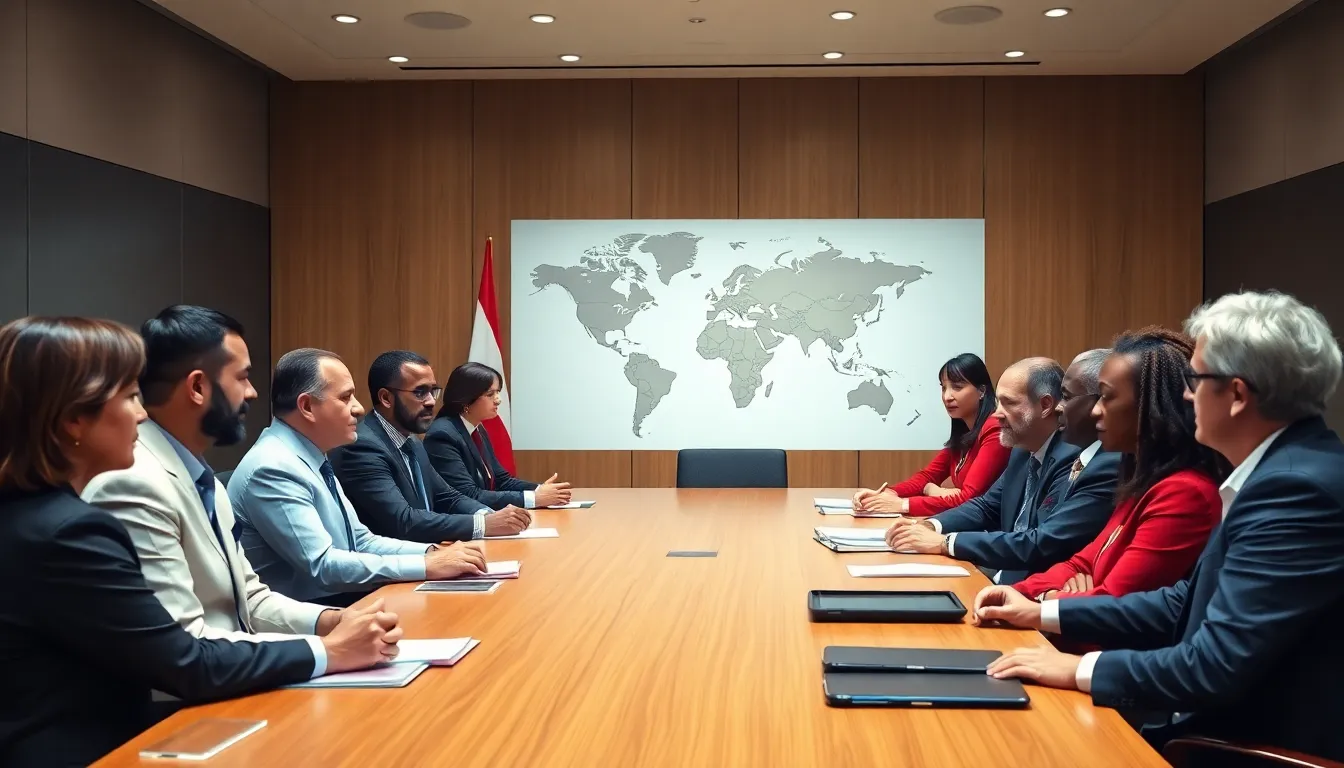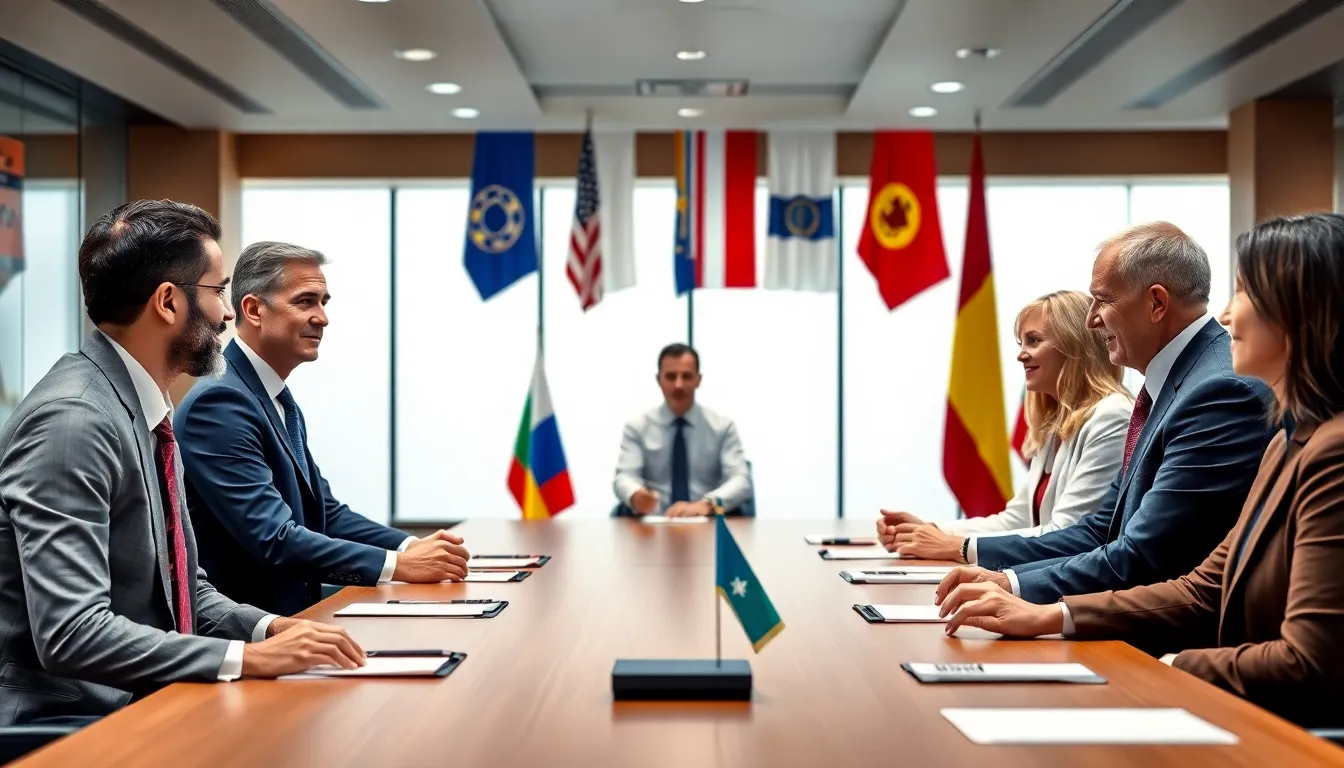In an increasingly interconnected world, international relations shape the dynamics of global politics, economics, and culture. Countries are no longer isolated entities; their interactions influence everything from trade agreements to security alliances. Understanding these relationships is crucial for grasping the complexities of today’s geopolitical landscape.
As nations navigate challenges like climate change, terrorism, and economic disparity, the study of international relations becomes vital. It provides insights into how governments negotiate, cooperate, and sometimes clash. By examining these interactions, one can appreciate the delicate balance that maintains peace and fosters collaboration on a global scale.
Table of Contents
ToggleOverview of International Relations
International relations encompass the interactions among sovereign states, international organizations, and non-state actors. They play a crucial role in shaping global policies, addressing transnational issues, and establishing diplomatic protocols. The dynamics of international relations include various elements such as:
- Diplomatic Engagement: Countries engage in diplomacy to negotiate treaties and resolve conflicts. Effective diplomacy promotes understanding and cooperation.
- Trade Relations: Economic interdependence thrives through trade agreements that facilitate the exchange of goods and services, thus promoting mutual growth.
- Security Alliances: Military partnerships, such as NATO, enhance collective security. Countries often collaborate to deter aggression and address common security threats.
- Cultural Exchanges: Cultural interactions through programs, tourism, and education foster mutual respect and understanding among nations.
The study of international relations involves several theories including realism, liberalism, and constructivism. Each theory offers distinct perspectives on how states interact and what motivates their behavior.
Key global challenges, like climate change, terrorism, and economic disparities, require collaborative efforts among nations. Understanding international relations empowers individuals and policymakers to develop strategies for effective responses to these global issues.
Key Theories in International Relations

Key theories in international relations provide frameworks for analyzing how countries interact. Understanding these theories enhances insight into global politics and strategic decision-making.
Realism
Realism prioritizes state security and power. Realists view the international system as anarchic, where states act primarily in their self-interest. Competition for resources often leads to conflict. Major scholars, including Hans Morgenthau and Kenneth Waltz, argue that military capability and national interest dominate international relations. Key principles of realism include the belief that conflict is inevitable, power is the primary currency, and states are rational actors.
Liberalism
Liberalism emphasizes cooperation and interdependence among states. It advocates for the role of international organizations, diplomacy, and trade in promoting peace. Scholars like Robert Keohane and Joseph Nye highlight the significance of non-state actors and transnational networks. Key principles of liberalism include the belief that democracy and economic ties reduce conflict, collective security enhances stability, and international law plays a vital role in guiding state behavior.
Constructivism
Constructivism focuses on the social constructs influencing state behavior. It posits that identities, values, and norms shape international relations. Scholars such as Alexander Wendt argue that perceptions and social interactions drive state actions. Key principles of constructivism include the belief that changing social contexts can reshape interests, the importance of collective identity in fostering cooperation, and the fluid nature of international relationships.
Each theory contributes uniquely to understanding the complexities of international relations, highlighting different motivations behind state actions.
Major Issues in International Relations
Major issues in international relations significantly impact global stability and cooperation. Understanding these challenges is essential for navigating the complex web of interactions between nations.
Globalization
Globalization refers to the increasing interconnectedness of economies, cultures, and political systems across nations. It drives trade, investment, and technology transfer, creating opportunities for economic growth. However, globalization also generates concerns, such as job displacement, economic disparity, and cultural homogenization. Addressing these challenges requires international cooperation and policies that promote inclusive growth.
Security and Conflict
Security and conflict remain central to international relations. States face threats from terrorism, cyberattacks, and regional disputes. Security alliances, like NATO, play crucial roles in collective defense, while diplomatic efforts attempt to resolve conflicts peacefully. Escalating tensions, such as those seen in the South China Sea or Ukraine, demand vigilant management through dialogue and negotiation to prevent escalation into armed conflict.
Human Rights
Human rights issues are fundamental to international relations, as they influence diplomatic relations and global norms. Violations, such as those seen in authoritarian regimes, provoke international outcry and impact trade deals and foreign aid. Organizations like the United Nations advocate for human rights, emphasizing protection and promotion. Addressing human rights abuses necessitates collaboration across nations to uphold dignity and justice globally.
The Role of International Organizations
International organizations play a crucial role in shaping global policy and fostering cooperation among nations. They facilitate dialogue, promote peace, and address transnational issues affecting multiple countries.
The United Nations
The United Nations (UN) serves as the primary international organization aimed at maintaining peace and security. Established in 1945, the UN promotes cooperation on various global issues, including human rights, humanitarian assistance, and sustainable development. The UN comprises several specialized agencies, such as the World Health Organization (WHO) and the UN Educational, Scientific and Cultural Organization (UNESCO), which focus on specific areas. The Security Council, a key component of the UN, wields significant power in addressing conflicts and authorizing peacekeeping missions. Through conventions and resolutions, the UN encourages member states to adhere to international standards, thereby promoting stability and cooperation globally.
The World Trade Organization
The World Trade Organization (WTO) is vital for regulating international trade. Founded in 1995, the WTO establishes rules for trade between nations, aiming to ensure smooth and predictable trading conditions. By providing a platform for trade negotiations, it helps resolve disputes and promotes fair trade practices. The organization focuses on reducing trade barriers, which enhances economic growth and fosters interdependence among nations. Members benefit from multilateral agreements that facilitate trade in goods and services while ensuring compliance with established standards. The WTO’s role in trade integration significantly impacts global economic relations, influencing how countries collaborate economically.
The study of international relations is vital in understanding the complexities of global interactions. As nations face shared challenges like climate change and security threats, effective collaboration becomes essential. By engaging with different theories and frameworks, individuals can better appreciate the motivations behind state actions and the importance of diplomacy.
International organizations play a crucial role in fostering cooperation and addressing pressing issues. Their efforts in promoting human rights, economic interdependence, and sustainable development are key to maintaining peace and stability. Ultimately, a nuanced understanding of international relations equips individuals and policymakers to navigate the intricate web of global affairs effectively.



